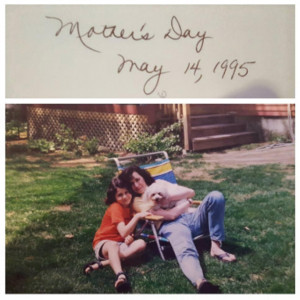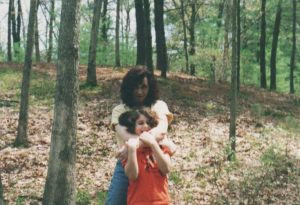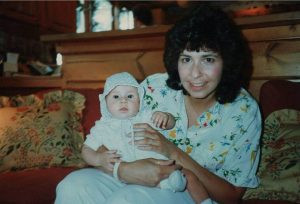“You will lose someone you can’t live without, and your heart will be badly broken, and the bad news is that you never completely get over the loss of your beloved. But this is also the good news. They live forever in your broken heart that doesn’t seal back up. And you come through. It’s like having a broken leg that never heals perfectly — that still hurts when the weather gets cold, but you learn to dance with the limp.” – Anne Lamott
 Woman grieving
Woman grieving
The sudden and devastating loss of a mother is a life-altering event, instantly reshaping a family’s landscape. In May 1995, my own family experienced this profound shift when my mom passed away unexpectedly. I was just eight years old, my sister nearly thirteen. My father, suddenly a single parent, sought solace and guidance in self-help books, desperately trying to navigate our shared grief. For two young daughters grappling with an unimaginable loss, and a father mourning his spouse, these books must have offered a glimmer of hope amidst the storm. Losing our mother just days after Mother’s Day added another layer of pain, a cruel reminder of what we had lost. Some wounds in life are so deep they defy comprehension, demanding acceptance rather than understanding.
One book that stands out from that time is Letters from Motherless Daughters: Words of Courage, Grief, and Healing by Hope Edelman. It’s a testament to my father’s struggle to connect with and support us through our grief, all while processing his own immense loss. He was trying to guide us through a storm, playing a calming melody as our world felt like it was sinking. He couldn’t stop the pain, but he hoped we would all find a way to survive.
 Father and daughter
Father and daughter
My mother’s death was not an isolated event but the beginning of a series of absences that have echoed through my life. She missed countless milestones: art shows, sports events, concerts, graduations, my wedding. For twenty-seven years, holidays and birthdays have been tinged with her absence. She never saw my home, and she will continue to miss countless moments, memories, and milestones for the rest of my life. This enduring absence is a pain that persists.
Anne Lamott’s quote, “a lifelong nightmare of homesickness,” perfectly encapsulates the ongoing ache of living without my mother. It’s a constant yearning for someone gone, for a home that no longer exists in the same way. This feeling of wanting to go home, but knowing you can’t, is a core element of grief. “Home” shifted irrevocably the day she died.
Finding meaning in loss is a journey, not a destination. It’s a gradual process of learning to live with the absence, of learning to dance with a limp, as Lamott so eloquently put it. For me, writing became a path toward meaning. As a writer since childhood, sharing my story and connecting with others became a way to navigate my grief. Last year, I took a significant step by pursuing grief support work, becoming a Certified Grief Educator and a Grief Support Specialist. I also launched my Instagram community, Girl Meets Grief, which has grown beyond my expectations, connecting with over 1,600 individuals. My essays have been featured in Chicken Soup for the Soul and online platforms such as The Mighty, The Manifest-Station, and The Motherlove Project.
Over many years, I’ve worked to reshape my narrative around loss and grief. It’s a delicate balancing act: acknowledging the profound impact of losing my mother early in life while refusing to let it define my entire identity. It’s a vital chapter, but not the complete story. It’s a part of who I am, but not all that I am.
 Woman supporting another
Woman supporting another
The reality of mother loss has shaped me in ways I’m still uncovering. Yet, there is so much more to me than just “motherless girl,” an identity I once fixated on as I navigated childhood and adolescence, feeling like an outsider, struggling to find my place and connect with my peers. Over time, I’ve learned to view this reality through a wider lens. This broader perspective doesn’t diminish the significance of the loss, but allows it to coexist with other facets of my being.
Transforming pain into something positive doesn’t erase the pain itself, but it can make it more bearable, less overwhelming. Helping others navigate their grief journeys won’t bring my mother back or undo the years of sorrow, but I believe it honors her memory. It’s a constructive way to channel my grief and longing for her. She is gone, a permanent truth. But by sharing her story and my own grief journey, by walking alongside others in their pain, I keep her memory and legacy alive.
Grief is love transformed. If love is eternal, why would grief be any different? We never stop loving those we lose, and we never stop grieving their absence. Love is forever. Grief is forever. Learning to dance with grief is learning to live with love in its transformed state.
To learn more about Julia and her work, visit her website.
Support grief awareness!
Subscribe to our YouTube channel: YouTube.com/GrapGrief.
Follow us on Facebook: Facebook.com/GrapGrief and Instagram: Instagram.com/GrapGrief.
